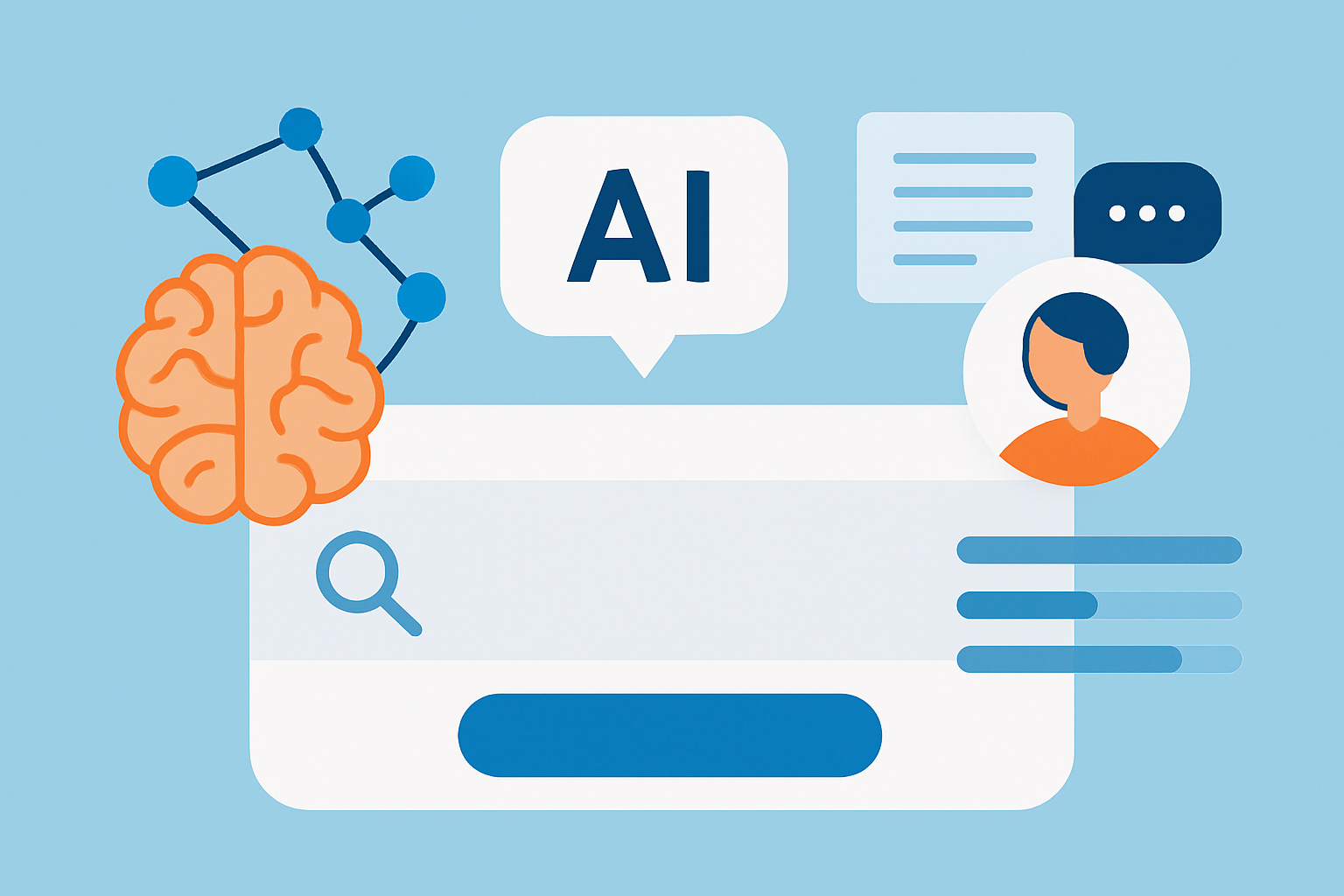How AI in Search Changes What You Find Online

Artificial intelligence is shaking up the world of online search like never before, changing not just what users discover but also the whole journey they take to get there. We dive into the freshest AI trends in search, cut through the noise by separating the fleeting fads from the game-changing shifts.
Search Evolution Moving Beyond Simple Keywords Toward AI-powered Understanding That Feels Almost Human
Search engines have come a long way from the days of simple keyword matching and link-based rankings. Over the years they have embraced semantic search, natural language processing and machine learning to get a handle on queries and content.
- Keyword indexing was the original hero helping search engines track down content by matching the exact words individuals typed in simple but effective ways.
- Then came Google's PageRank algorithm which shook things up by ranking pages based on how they linked to each other. It shined a light on what’s genuinely relevant rather than just popular.
- Semantic search took a clever leap forward by grasping the intent and context behind queries instead of just fixating on the literal terms.
- Natural language processing added the ability for search engines to tackle more complex questions and chatty conversational inputs making interactions feel more human.
- Nowadays AI-driven context analysis effortlessly juggles multiple signals at once, fine-tuning and personalizing results faster than you can blink.
What ‘AI in Search’ Really Means These Days
AI in search today is more than just tweaking a few algorithms. It uses sophisticated machine learning models that pay attention to how users interact. Deep learning systems understand tricky language and image patterns. Natural language processing catches subtle turns of phrase. Computer vision analyzes images and videos to make them searchable. Behavioral analytics fine-tune the experience by adapting results to user preferences and context.
These AI technologies do a fantastic job of making search results not just relevant but tailored to each individual user, all while cranking up the speed so results pop up almost instantly.

Visualization of AI components integrated into modern search engines enhancing user query understanding and personalized results
Important Trends in AI-Powered Search Technologies That Are Changing the Game
Semantic search and query understanding have really become the backbone of modern search engines helping them grasp what users truly mean rather than just skimming the surface with keywords alone.
AI-generated featured snippets and direct answers jump straight to the point offering clear and handy info right off the bat so users don’t have to wade through page after page of links.
The introduction of visual and voice search means individuals can interact using images and their own voice. This makes the whole searching experience feel way more natural and easier to get to grips with.
Personalized search tweaks results by taking into account user behavior, preferences and context. This usually means the outcome hits closer to home and feels thoughtfully tailored.
Real-time result updates pull in the latest data to keep answers fresh on the spot. This is a lifesaver when things are moving fast and you need accuracy without delay.
Each trend nudges the way users interact with search engines to a whole new level. Take Google’s BERT model for instance—it really seems to get the meaning behind our words rather than just the keywords. Meanwhile, Bing’s visual search lets you hunt for info using images which is neat when words won’t cut it.
How AI Is Quietly Revolutionizing the Quality and Flavor of Search Results
AI has transformed search results far beyond boring old lists of links. Nowadays you’re more likely to get detailed context-aware answers that feel tailored to you. Results often come with AI-generated summaries, embedded multimedia, and dynamically updated local or personalized info that fits your needs and current situation.
- Search results have become much sharper and more accurate because AI truly understands what people are looking for.
- The days of exact keyword matches ruling the roost are over because context and intent now play the main roles in search rankings.
- Direct answers and zero-click searches have become very popular by providing quick information without the need to click through links.
- You’ll see that search results now showcase a mix of content types like videos, images and podcasts. They are all displayed on the page without extra searching.
- AI also works behind the scenes to boost local and personalized relevance by analyzing your location and preferences in real time. This makes the experience feel more tailored to you.
"AI-powered search often works like a charm, really boosting user satisfaction by truly grasping those tricky, complex queries and delivering accurate, context-aware results. In my experience, this can save a ton of time and make the whole process of uncovering information feel a lot smoother — almost like having a smart buddy by your side." – Dr. Eva Martinez, Search Technology Expert
What Users Actually Discover and How Their Actions Shift Over Time
AI in search is shaking up not only what users find but also how they hunt for information and interact with results. Personalization taps into past searches, location and device type so people often expect results tailored just for them—like a digital barista knowing their favorite brew. This shift has nudged voice and visual queries into the spotlight.
- Users often end up with search results that feel a bit more personal and local, making them hit closer to home and generally more relevant.
- The surge in voice and visual search queries highlights a clear shift toward hands-free, more intuitive ways to connect with technology.
- Nowadays, plenty of individuals lean on AI-generated summaries and featured snippets to quickly catch the gist without drowning in details.
- There is been a noticeable jump in engagement with rich media like videos and interactive content, which keeps things lively.
- This uptick in personalization can sometimes backfire by creating filter bubbles and echo chambers, limiting the variety of content that users actually see.
A Closer Look
Even with all the leaps and bounds AI has made in search, there are still some pretty important risks lurking beneath the surface. For starters, algorithmic biases can sneak in and throw fairness out the window. Then there’s the pesky problem of misinformation spreading like wildfire thanks to AI-generated content. Plus, we might see a bit of a dulling effect on content variety as certain voices start to drown out the rest. Privacy concerns also pop up, especially with the heavy tracking of user behavior.
Bias in AI models can sneakily influence search results, often reinforcing tired stereotypes or quietly sidelining certain groups.
Misinformation and fake news spread faster than wildfire when AI-generated content isn’t double-checked properly.
Smaller content creators might find themselves getting less organic traffic, since AI tends to play favorites with authoritative or mainstream sources.
Privacy and data security concerns keep bubbling up as AI leans more heavily on personal user data to tailor those search results.
The way AI makes decisions is often shrouded in mystery, making it tough for users to really grasp or challenge how search results end up ranked.
Key Points for Businesses and Content Creators You’ll Want to Keep in Mind
AI in search really calls for a thoughtful rethink from both businesses and content creators alike. SEO can no longer be just about stuffing keywords. Instead, it is about focusing on topic relevance and truly understanding what users want. Leveraging structured data and schema markup has become a game-changer for adapting to new AI-driven features such as featured snippets and those eye-catching rich results.
- Move beyond just mindlessly repeating keywords and really dive into covering topics thoroughly and within their proper context.
- Tweak your content to increase your chances of showing up in AI-generated featured snippets and rich results which can seriously boost your visibility.
- Don’t forget to use structured data and schema markup since these helpers make it much easier for AI systems to understand and showcase your content.
- Spice things up with a mix of multimedia elements like images and videos because it is a smart way to keep pace with shifting search preferences.
- Keep a close watch on the ever-changing AI-driven search patterns so you can adjust your strategies early and stay one step ahead.
Looking Ahead at the Future of AI-Enhanced Search A Glimpse That’s Hard to Ignore
The future is clearly steering us toward conversational AI search assistants that blend text, voice and visual inputs to make interactions feel as natural as chatting with a friend. These assistants often serve up hyper-personalized results that seem to have a sixth sense for your context and preferences and adapt on the fly. Meanwhile, the spotlight on ethical AI is only getting brighter and is shaping search experiences that strive to be transparent, fair and respectful of your privacy—because nobody likes feeling spied on. Taking a peek at the reasons Google integrates AI in search can really shed light on why these changes are happening and where we might be headed.
| Trend | Anticipated Timeline | Potential Impact on Search Experience | Opportunities for Businesses | Challenges to Address |
|---|---|---|---|---|
| Conversational AI Search Assistants | 1-3 years | Enables smooth, natural chats with search, just like talking to a knowledgeable friend | Opens fresh ways to engage customers via voice and chat, adding a personal touch | Nailing down consistent, accurate, and unbiased responses without sounding robotic |
| Multimodal Search (Text, Voice, Image) | 2-4 years | Combines different input types to get a clearer picture of what users really want | A golden chance to craft marketing campaigns that stand out by mixing media formats | Juggling the tricky task of optimizing across varied input types without losing steam |
| Hyper-Personalized Result Streams | 3-5 years | Offers results that evolve on the fly, tailored to each user's unique preferences | Lets businesses zero in on customers with pinpoint precision, making outreach feel less like a sales pitch | Walking the fine line between personalization that delights and respecting user privacy |
| Ethical and Transparent AI Deployment | Ongoing | Builds trust by shining a light on how AI choices shape search results | Helps businesses stand out by championing ethical AI practices in their brand story | Crafting clear standards and keeping pace with ever-changing regulations |
| Real-Time Dynamic Result Updates | 1-2 years | Serves up instantly refreshed info, perfect for breaking news or trending buzz | Enables timely marketing blitzes that ride the wave of fast-changing data | Keeping data spot-on accurate while moving at lightning speed |
Really stay ahead of the curve, businesses and marketers have got to keep a close eye on how AI is shaking up the world of search. It’s all about investing in SEO strategies that are not just rigid formulas but flexible, meaning-driven approaches that actually resonate. Plus, gearing up to engage users through fresh formats and new interfaces is going to be a game changer.





